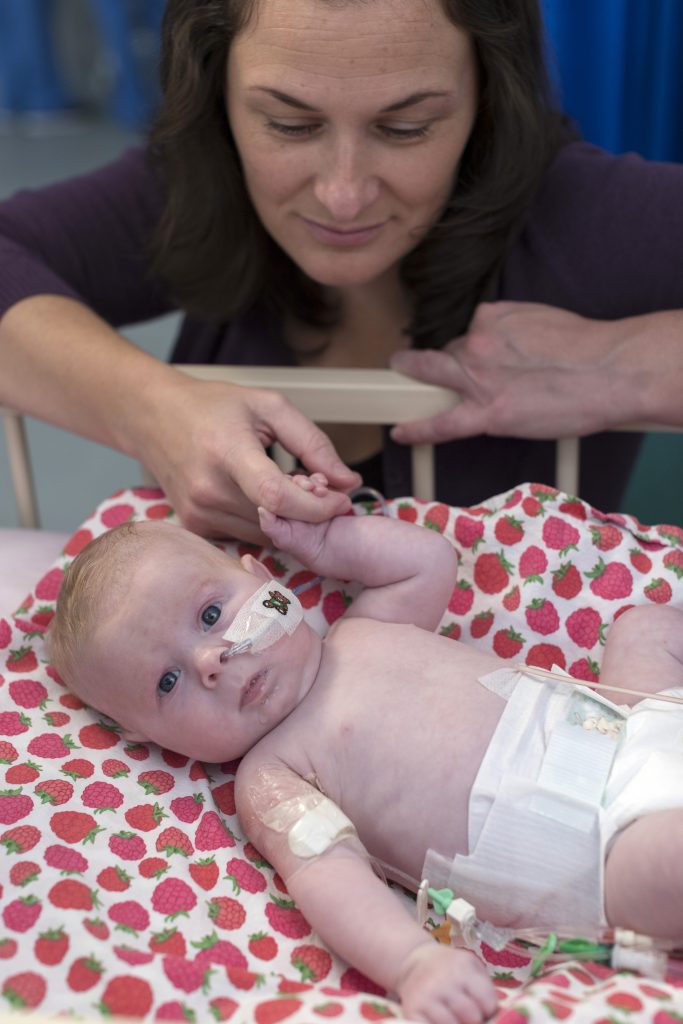Rea’s Story

Lisa Reynolds’ pregnancy was fairly event free until a scan at 33 weeks revealed that there was excess fluid around her baby. Lisa was sent home but told to prepare herself for a possible early labour. A week later her waters broke.
As they were in Sussex at the time visiting her husband’s family, Lisa was admitted to a local hospital where, that evening, she went in to very rapid labour. Baby Rea Haf was born at 8:46pm on the 7th of August and after a quick hug from her mum and dad, was whisked off to the special care baby unit.
As Lisa had some complications arising from Rea’s birth she didn’t see her baby again until much later that night. Lisa says: “The relief I felt when I saw Rea was just overwhelming but the calm at seeing her there and ok didn’t last long. Still paralysed from the epidural I’d been given, I was woken up in the early hours of the following morning by a consultant saying that Rea wasn’t feeding and they were concerned that she had a blockage. They said that they were preparing to transfer her to Brighton for emergency surgery.”
Less than ten hours after she’d been born, Rea was in an ambulance and on arriving in Brighton, she was taken down for surgery.
Lisa continues: “I can’t even begin to explain what it felt like seeing her being taken away that morning. We hadn’t had a chance to hold Rea or even take a good look at her and here we were, signing a consent form for her to be cut open. I just wanted to shout “Please don’t, just let me take her home.” It was four hours before we could see her again and it was undoubtedly the longest four hours of our lives.”
Rea was diagnosed with tracheo-oesophageal fistula (TOF), which in her case meant that her trachea and oesophagus had fused together and that her oesophagus was detached from her gut. Doctors had managed to fix the first problem but would have to wait for her oesophagus to grow so that it could be stretched to connect to join her stomach.
After waiting a few days for a cot to become available, Rea and her mum and dad were transferred to the intensive care unit at the University Hospital for Wales neonatal unit. Lisa says: “We’d been desperate to be transferred closer to home but the reality of actually going home for Mathew and I without Rea was awful. It’s a moment that every parent-to-be anticipates with such excitement but for us, we had all the baby things there, but no baby.”
At three-weeks-old Rea developed an infection which affected her breathing so she was put on a ventilator while they waited for antibiotics to work. Lisa and Mathew were also told that, as a result of the infection, Rea would need a blood transfusion.
“When the doctors told us about the blood transfusion I just sobbed” says Lisa. “I couldn’t understand how things could seemingly be going ok one minute and then be going so badly the next. But the staff on the unit were just amazing. They explained that babies like Rea don’t just get a case of the sniffles. They go downhill very rapidly but they can recover very quickly too and a few days after her transfusion, Rea did.”
Rea spent seven months on the neonatal intensive care unit at the University Hospital for Wales before being transferred to Great Ormond Street for an operation to correct the problems with her oesophagus. After two months in London with her mum, Rea finally went home for the first time in May.
Lisa says: “Nobody can imagine your heartache as you look at your baby for the first time, in an incubator, wires and tubes everywhere, alarms beeping, helplessness raging through your tired body. But through all these things, all these feelings there are amazing people who are there 24-7 that will support you, guide you, comfort you and try their upmost to make you feel ok about it all. Those people are the incredible staff of the NICU.
“I honestly believe that after almost 7 months of ‘living’ in the NICU I wouldn’t still be standing if it wasn’t for these people.”
As a thank you for the care Rea has received, Lisa, along with her friends and family, are now supporting the Tiny Lives Appeal. The appeal aims to raise £1 million to support the care of premature and critically ill babies at the University Hospital for Wales. For more information, click here.







